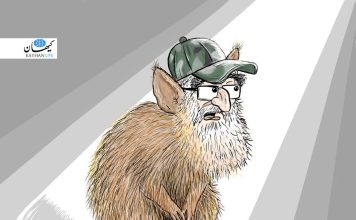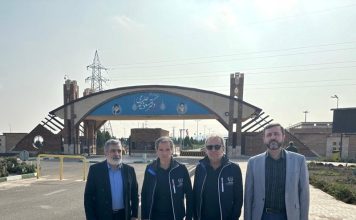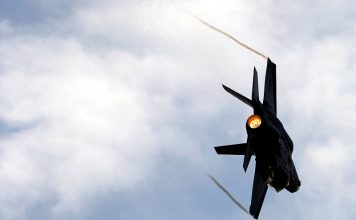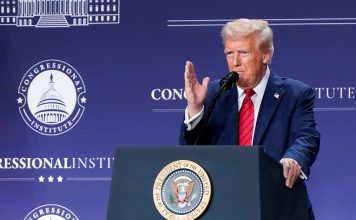By Firouzeh Nabavi
Neda Toloui-Semnani is an Emmy-award winning Iranian-American writer and producer and the author of the new book: They Said They Wanted Revolution: A Memoir of My Parents.
Published in February 2022, the memoir describes how her Iranian parents were radicalized at the University of California, Berkeley in the late 1960s and 70s, and returned to Iran in 1979 to join the Islamic Revolution — a decision that would dramatically upend their lives and those of their next of kin.
Neda’s parents had met at Berkeley in 1969. Her mother, Farahnaz Ebrahimi, had moved to Monterey, California when she was 10 to join her own mother, a divorcee who had left Iran after the 1953 coup as part of the early wave of Iranian emigres, and resettled in the United States.
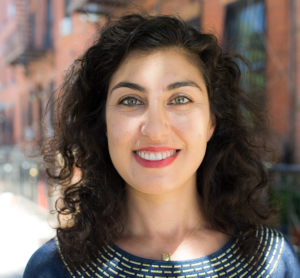
Neda’s father, Faramarz, had moved to the US in the early 1960s to study, first in the Midwest, then at Berkeley. There, he met Neda’s mother.
Berkeley was a hotbed of activism in those days: it had a Marxist-Leninist student body in the 1960s, then moved even further to the left and became Maoist in the 1970s. Neda’s parents were not political to begin with. Yet after staying at Berkeley, they became active members of the Union of Iranian Communists — a Maoist wing of the Confederation of Iranian Students, an anti-Shah movement.
Neda’s parents returned to Iran after the 1979 Islamic Revolution in the hopes of finding a better Iran. Yet the Islamic Republic had no mercy for communists and leftist activists. So for two years, Neda’s father joined the leadership of an underground leftist opposition group with which her mother was also briefly affiliated.
In January 1982, a small faction calling themselves the Sarbedaran-e Jangal (named after a 14th-century rebellious movement of that name) challenged the regime in the town of Amol in northern Iran. Many members were killed and the rest were captured.
Neda’s father, who had opposed this armed movement and was no longer part of the leadership, went into hiding with his wife and daughter. He was arrested by the Revolutionary Guards in the summer of 1982. Neda’s mother — who was seven months pregnant with Neda’s brother Nema — and 3-year-old Neda were forced to flee across the border to Turkey along with their family members. Neda’s father was executed in January 1983.
Neda and her family settled in Washington, D.C. She went on to obtain a Master of Science degree in gender and social policy from the London School of Economics and Political Science, and a Master in Fine Arts in nonfiction from Goucher College. Her mother sadly passed away in 2010.
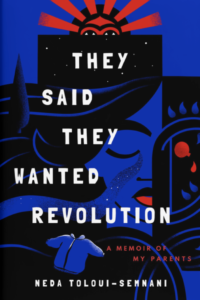 Neda now lives with her husband and newborn son in Brooklyn, New York. She is a senior writer with the television news program Vice News Tonight. Her work has appeared in publications including the Washington Post, New York Magazine, the LA Review of Books, BuzzFeed, and Roll Call among others. She was named a 2018 fellow with the Logan Nonfiction Program and a 2017 NYSCA/NYFA fellow in Nonfiction.
Neda now lives with her husband and newborn son in Brooklyn, New York. She is a senior writer with the television news program Vice News Tonight. Her work has appeared in publications including the Washington Post, New York Magazine, the LA Review of Books, BuzzFeed, and Roll Call among others. She was named a 2018 fellow with the Logan Nonfiction Program and a 2017 NYSCA/NYFA fellow in Nonfiction.
Kayhan Life interviewed the author about her memoir and the 1979 Revolution, as well as about the revolution that is currently under way in Iran, following the mid-September death of 21-year-old Mahsa Amini while in the custody of the morality police.
What is your reaction to the wave of protests taking place in Iran right now?
I’m incredibly proud and in awe of the protesters in Iran. They’re standing up to extremists, despots, and corrupt officials. Their bravery has inspired people around the world. I suspect that if these protests continue, they will spur other women in other countries — Afghanistan, India, even the United States — to demand that governments respect their rights too.
There’s a lot to learn from these Iranians. But it’s also devastating to hear how the Islamic regime is choosing to fight against its people by resorting to mass arrests, torture, and violence. My heart breaks for Iran, even as I feel something close to hope that, perhaps, we are arriving at the final days of the regime.
When did you decide to write this memoir and why?
I can’t remember a time when I didn’t want to try and write this book, or at least a book that was about the story of my parents. When I was very young and still in elementary school, and I would tell people that I would write this book, I think I wanted to learn exactly what happened to my family: Why was my father gone? Why were some of us living in the U.S. and others in Iran?
Decades later, I tried to convince myself that it was a journalistic exercise: how do you tell the story of complicated people and their movement? How do you piece together a complex history and weave it into what is essentially an escape narrative?
When I was in the thick of the reporting and writing, my reason for putting this volume together shifted again: I realized that this was a story about grief and about grappling with a lifetime of loss — the loss of family, of language, and of culture. I’ve seen that grief reflected back to me in our Iranian-American history.
That grief is what I examine in my book. It’s now a tribute to my family, a meditation on loss, and a declaration of self.
What does the title of your book They Said They Wanted Revolution mean? Can you please elaborate?
One day, I was driving around, and I heard The Beatles start to sing: “So you say you want a revolution, we all want to change the world.” And I immediately started to cry. The song was released around the time that my parents met and I just thought, “Well, they said they wanted revolution.” I chose to investigate what it means to attempt to overthrow a government without knowing what might come next. The soaring peaks of victory, paired with the absolute devastation of failure.
This book, in many ways, is about the aftermath of choosing to change the world – for good and ill. Today, of course, I’m watching what might evolve into another revolution, and I hope that civic-minded people will step into the power vacuum that lies ahead. I hope that Iranians are examining the lessons from their own 1979 revolution and those of the Arab Spring. It’s as important to consider the banality of victory and what’s necessary to govern as it is to challenge the regime. I’m sure people are already doing this.
Your father was tragically executed by the Islamic Republic of Iran when you were a little girl of 3. You are understandably proud of him and of his bravery and legacy. At the same time, his student activism deprived you of the love of a father. Do you sometimes wish that he had been less politically engaged and more neutral in his student days?
I miss my father and have done so every single moment of every day since we were separated. I, of course, wish he had survived, but I don’t wish he was neutral. I do wish he had lived long enough for some of his views to have evolved — or long enough to share how his views had changed. Most people who survive into middle age mature, and I’m curious as to how he would have contended with the choices he made as a younger person.
At the end of your book, you have published some heart-stopping texts: excerpts of your father’s trial by a revolutionary court, and the letter that he wrote before his execution. Why are they published at the end and not in the main body of the book?
The book is divided into three sections, so it made sense to have the trial transcript come at the end of part two. We see the trial through my mother’s eyes and, because of the transcript, my father’s also represented in some way. I wanted to have their voices in the book, so I used primary source materials to do so. These documents are also a signal to the reader that this is a work of serious journalism…a way of showing my effort and sources.
Your mother was also a student activist at the University of California who wished for a Revolution in Iran. She sadly passed away a decade ago. What were her own feelings about the Revolution in the decades that followed?
My mother was an extraordinary woman for many reasons, but one of the main ones was that she could comfortably hold complicated, even contradictory feelings. She could see where the anti-Shah movement failed, wished that they or she had done some things differently, endured the trauma of the revolution, while also being proud of a lot of what she and the transnational protest movement accomplished. It was a good life lesson for me.
What are your own personal feelings about the Iranian Revolution, and the way it turned out? What are your feelings about the concept of revolution in general, and how appealing it is to young people?
I think that sometimes, very rarely, revolution is an appropriate response to corruption and totalitarianism. But I also know that the aftermath of a revolt will be devastating. Not only is it a social and psychological fissure, but systems don’t magically and perfectly fall back into place. Creating systems of government, and attempting to fix long-standing systemic problems in a complicated global landscape while continuing to govern is mind-bogglingly difficult.
What I know is that it will be hard; there will be pain and frustration. But I also know that sometimes it’s worth at least trying to reach for a more just, representative, and democratic government.
I don’t believe that revolution is fun, or a lark. It is, or should be, a last resort: the break-glass-in-case-of-
In your introduction to the book, you describe how, as a journalist covering protests against the death of George Floyd in the summer of 2020, you were suddenly reminded of stories about your activist and revolutionary parents, and felt compelled to write your own memoir. Can you explain that connection?
When I see people marching, demonstrating, and agitating for a more just and fair world, I think of my parents. My parents weren’t just marching for a single cause, but as I point out in the book, their political awakening came out of the 1960s in the U.S. and Europe.
Protest movements or movements for social justice are usually met with violence, and the protests in the summer of 2020 in the United States were no different. They felt like an inflection point.
The protests in Iran right now feel similar — they are being led by young women and others who are risking their lives and their futures for justice. It’s a righteous cause, and we don’t know how it will end and how many lives will be sacrificed.
What kind of a future would you like Iran to have? And do you hope to be able to go back one day?
I would love to go back to Iran. I want to bring my son and husband; I’d love to live there and travel around the country. I’d love to see family and friends, to visit the graves of those we’ve lost, and meet family and friends I’ve been apart from all these years.
More than anything, I want Iranians to feel hopeful for their futures, and the futures of their children. I believe that the women of Iran are leading the way so that this can happen. I only wish I could be there in person to join them in their efforts.





